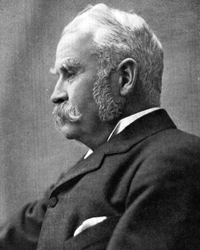William Schwenck Gilbert, one half of the successful Gilbert and Sullivan duo, had a knack for satire and an eye for staging, producing comic operettas beloved to this day, including “The Pirates of Penzance” and “The Mikado.” Gilbert coped with a difficult childhood with disagreeable parents and surmounted a period of indecision before launching himself into a renowned career writing for theater.
W.S. Gilbert’s Early Days
William Schwenck Gilbert was born on November 18, 1836, in London, the oldest child of William, a retired naval surgeon, and Anne. Over the next decade, the couple had three daughters, and the family traveled around Europe before settling in England in 1846.
Gilbert attended private schools, culminating with a bachelor’s degree from King’s College, London. While in school he was drawn to the theater during England’s Victorian period. He “became a regular playgoer” in the 1840s and ’50s, and dreamt of a career in acting. But soon, he would take up playwriting, and produced and directed shows while still in school, according to the W.S. Gilbert Society.
His parents’ “stormy marriage” gave way in 1876 when the two separated, leaving young Gilbert to absorb the blow. His parents were reportedly “spiky, angry characters” and unaffectionate, which rubbed off on Gilbert’s own personality. He was seen as creative, but also cold and “something of a bully.”
Sources in this Story
- The Victorian Web: Sir William Schwenck Gilbert: A Brief Biography
- Daily Telegraph: Thespis: When Gilbert Met Sullivan
- MIT Gilbert and Sullivan Players
- Boise State University Gilbert and Sullivan Archive
- Pop Matters: The Film Versions of Gilbert & Sullivan’s ‘The Mikado’ and ‘Topsy-Turvy’ Stand on Unequal Footing
After college, Gilbert experienced “an aimless period,” trying unsuccessfully to fight in the Crimean War, working as a government clerk and studying law. He eventually abandoned law in 1863, having “made the first decisive steps into writing professionally.” Initially, he worked for a “new comic periodical called Fun.”
Gilbert’s Notable Accomplishments
In 1871, theatre manager John Hollingshead introduced Gilbert to a young composer named Arthur Sullivan, who would become his longtime collaborator. The newly arranged duo produced “Thespis,” a musical burlesque show that would influence their later works, including the soundtrack for “The Pirates of Penzance,” according to the Daily Telegraph.
Gilbert and Sullivan wrote 14 comic operettas in total, which remain popular more than 100 years later. The Massachusetts Institute of Technology has one of the many theater groups inspired by the duo’s satiric songs and lighthearted approach to the stage. According to the MIT Gilbert & Sullivan Players web site, the duo’s “operettas were the forerunners of our modern musicals, and in many ways resemble them more than they do the grand operas.”
By 1875, Gilbert and Sullivan had each achieved individual success, but had not been able to work together. But actor Richard D’Oyly Carte brought the two back together, asking them to work on a short opera. On March 25, the show “Trial by Jury” opened at London’s Royalty Theater to great acclaim, drawing crowds well into the summer and again later that year. Ultimately, the show was a catalyst for Gilbert and Sullivan’s continued partnership.
The Man and his Work
- “The Pirates of Penzance” (DVD)
- “The Ultimate Gilbert & Sullivan Collection” (Audio CD)
- “W. S. Gilbert: A Classic Victorian and His Theatre,” by Jane W. Stedman
- “Topsy Turvy” (DVD)
The Rest of the Story
The 1999 film “Topsy Turvy,” helmed by British director Mike Leigh, is a biographical piece about Gilbert and Sullivan and the making of their highly successful “faux-Japanese operetta, The Mikado.” A humorous period piece, “Topsy Turvy” also incorporates issues of race and class, according to PopMatters.
Gilbert granted an interview to Strand magazine in 1891 while living at Graeme’s Dyke, a house in Harrow Weald, England, toward the end of his life. He spoke about collaborating with Sullivan, among other topics. “When Sullivan and I first determined to work together, the burlesque stage was in a very unclean state. We made up our minds to do all in our power to wipe out the grosser element,” he said. Another interesting tidbit about Gilbert’s method was revealed; according to the interviewer, Gilbert had “an exact model of the stage made to half-inch scale,” which he used when figuring out scene arrangements.
Gilbert was knighted in 1911 by King Edward VII, and died a surprising death at Graeme’s Dyke. He dove into a pond to save a drowning girl and suffered a fatal heart attack in the water.
The Gilbert and Sullivan Archive, maintained by Boise State University, provides background information on each comic operetta composed by Gilbert and Sullivan, from “Thespis” to “The Grand Duke.”
This article was originally written by Sarah Amandolare; it was updated November 18, 2017.











